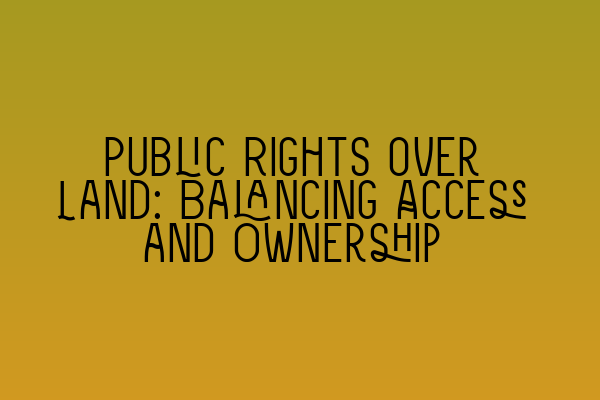Public Rights over Land: Balancing Access and Ownership
In property law, one of the most significant issues to address is the balance between public access rights and private ownership of land. While individuals have the right to own and enjoy their property, society recognizes the importance of maintaining public access to certain areas for various reasons.
Understanding the concept of public rights over land requires a careful examination of the legal framework and the principles that govern them. Let’s delve into the topic and explore the key aspects involved.
What are Public Rights over Land?
Public rights over land refer to the legal privileges granted to the public to access and use certain areas of land. These rights serve various purposes, including recreational activities, transportation, historic preservation, and environmental conservation.
Different types of public rights exist, such as:
1. Public footpaths and bridleways: These are established routes that allow the public to walk or ride horses across private land, usually in the countryside. Access to these paths is crucial for leisure activities like hiking and horseback riding and helps to preserve the cultural and natural heritage of the area.
2. Public highways: Public highways include roads and streets that are open for public use, providing access to different locations. Maintaining an efficient and accessible road network is crucial for transportation purposes and ensures smooth movement of people and goods.
3. Public parks and open spaces: Public parks and open spaces offer recreational opportunities and serve as places for relaxation, exercise, and community gatherings. These areas are usually maintained by local authorities and are open to the public.
4. Beaches and coastal areas: Coastal access rights grant access to beaches and coastal paths, allowing the public to enjoy the natural beauty of these areas. Such rights play a significant role in promoting tourism, supporting local economies, and safeguarding the environment.
Balancing Access and Ownership
Balancing public access rights with private ownership is a delicate task that requires consideration of various factors. Property owners have legitimate expectations of privacy and control over their land, while the public has the right to benefit from the shared resources and enjoy access to certain areas.
To achieve this balance, the law imposes certain restrictions and responsibilities on both landowners and the public. Landowners must respect and facilitate public access rights, while the public must exercise their rights responsibly, without causing damage or inconvenience.
In many cases, these rights are regulated through legal mechanisms, including statutory provisions, easements, and land management schemes. Local authorities and governing bodies play a crucial role in overseeing and regulating public access to ensure fairness and prevent abuse.
Sharing Responsibility: Landowners and the Public
Landowners have a responsibility to be aware of and respect the public rights associated with their land. They should ensure that public access is not impeded or obstructed, providing appropriate signage, maintaining footpaths, and allowing reasonable use of the land.
On the other hand, the public also has a role to play. Individuals must familiarize themselves with the legal framework governing public rights and act responsibly when exercising their privileges. Respecting private property boundaries, sticking to designated paths, and following relevant rules and regulations are essential for maintaining a harmonious relationship between landowners and the public.
Conclusion
The issue of public rights over land is a complex and multifaceted one, with the need to strike a balance between private ownership and public access. Recognizing the importance of shared resources and managing access in a fair and responsible manner is crucial for preserving our heritage, supporting local communities, and protecting the environment.
As a solicitor specializing in property law, SQE Property Law & Land Law can provide expert advice and assistance on matters related to public rights over land. Contact us today to discuss your requirements and ensure that you are well-informed and protected in matters concerning access and ownership.
Related Articles:
– SQE 1 Practice Exam Questions
– SQE 1 Practice Mocks FLK1 FLK2
– SQE 2 Preparation Courses
– SQE 1 Preparation Courses
– SRA SQE Exam Dates
